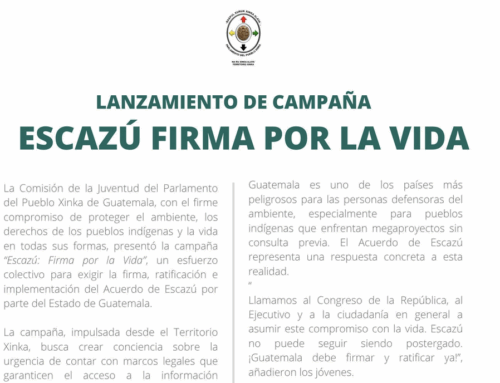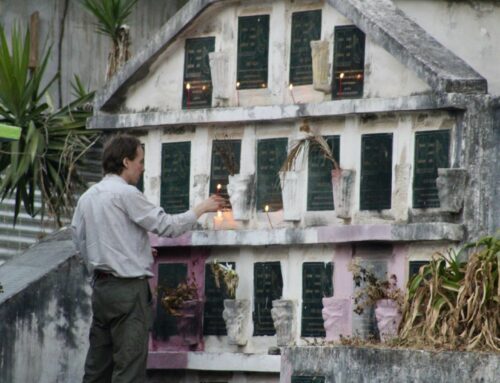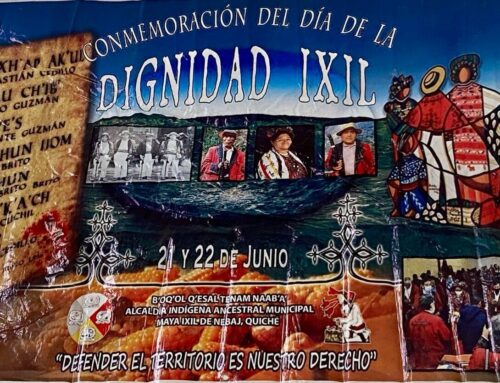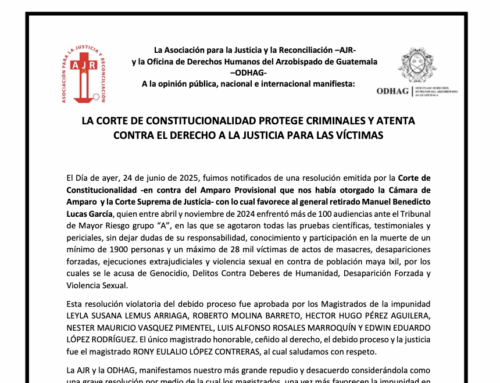For a downloadable version of this media advisory, click here.
For nearly a year and a half, Guatemalan President Jimmy Morales has repeatedly defied the rule of law by attacking the UN-backed International Commission Against Impunity in Guatemala (CICIG). On January 7, Morales announced that his administration would unilaterally cancel the international agreement that established CICIG over a decade ago, defying Constitutional Court orders in what amounts to a technical coup. The crisis continues to play out in a struggle between the executive branch and the Constitutional Court, and threatens to exacerbate the conditions that force people to migrate to the U.S. by further entrenching corruption and impunity in the country.
Guatemala’s impunity state has its roots in the country’s Internal Armed Conflict (1960-1996) and the government’s failure to deliver justice for genocide and other crimes committed by the state. As Edwin Canil, president of the survivor-led Association for Justice and Reconciliation, explains, “All of the intellectual authors of the genocide are quite content right now, because they benefit from a weak state. We fear that the situation could return to how it was in the 80s with kidnappings and disappearances. If they take control of the judicial system they will criminalize anybody.” Morales’ party, Frente de Convergencia Nacional, is largely made up of major military leaders, many of whom stand accused of crimes against humanity and genocide.
The Morales administration’s flagrant disregard for the rule of law has concerning implications for social movements and Guatemalans migrating to the U.S., where immigrants face growing repression and border militarization. In 2018 alone, nearly 30 human rights defenders were assassinated in Guatemala, crimes which mostly remain uninvestigated. Many of these activists were targeted for defending Indigenous land sold off to extractive industries by corrupt officials, a widespread reality that continues to force many to leave their homes. According to a woman land defender with the Peaceful Resistance to the Escobal Silver Mine, “Executive and oligarchic powers have kept the country under their heels for many years, but today the true Guatemalans have woken up to defend our human rights and demand respect for the voice of the people. By contaminating our natural resources, sowing social division, and devaluing our country’s sustainable production, they force Guatemalan families to immigrate to other countries.”

On January 6, fifty Guatemalan social justice organizations released a statement calling for the “international community to condemn the crimes that the government of Guatemala has committed and to ask for continued rule of law and legal certainty.” In the midst of the longest government shutdown in history, the U.S. has responded to the current crisis with inaction, adding to its historic failure to address systemic issues, many caused or worsened by its own policies, that force people to leave their homes.
CONTACTS
As an organization with nearly four decades of relationships in Guatemala, NISGUA is available to facilitate contact between news agencies and human rights defenders. The leaders listed below are available for comments and interviews, and their contact information is available upon request. Please direct all inquiries to organizer@nisgua.org or 510-763-1403.
Ada Valenzuela
Executive Director, National Union of Guatemalan Women (UNAMG)
Speaks Spanish
Iduvina Hernandez Batres
Activist and Journalist
Speaks Spanish
Sandra Neneth Morán Reyes
Diputada, Congreso de Guatemala
Speaks Spanish and English
Edwin Canil
President, Association for Justice and Reconciliation
Speaks Spanish
Rigoberto Juárez
Indigenous Maya leader, Plurinational Government of the Q’anjob’al, Chuj, Akateka, Popti and Mestiza Peoples
Speaks Spanish
Leocadio Juracán Salomé
Diputado, Congreso de Guatemala
Speaks Spanish
Juan Francisco Soto
Director, Center for Legal Action in Human Rights (CALDH)
Speaks Spanish






Leave A Comment